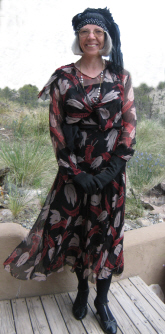
|
|
|
|
|
|
|
|
|
|
|
|
|
|
|
|
|
|
Here's where I plan to link all those fun bits and pieces about England and Heroes and maybe some neat Regency pictures and articles, as soon as I can.
Meanwhile, here I am in one of my genuine antique dresses from the 1930's.
Not Regency, but it makes me feel almost ready for tea at Downton Abbey!

plus a postscript about pronouncing the names of some of my characters:
by Julia Ross
As you'll see....
According to the nursery rhyme, "The man in the moon came tumbling down and asked his way to Norwich. He went by the south and burnt his mouth by eating cold pease porridge." Yes, in England Norwich (norridge) rhymes with porridge. If the moon had asked for Nor-witch, he'd still be lost.
Similarly, Warwick is Worrick (not War-wick); Hardwick, Har-dik; and Keswick in the Lake District is Kezzik.
"Doctor Foster went to Gloucester in a shower of rain" because Gloucester is pronounced Gloster. Most of the place names ending in '-cester' behave the same way. Thus we have Bicester—Biss-ter; Leicester—Less-ter; Worcester—Wuss-ter; and Leominster is Lemster. Yet though some guide books may tell you that Cirencester is pronounced Sissiter, you're more likely to hear Siren-sester, so take your pick!
Another ending to watch out for is '-ham' meaning village or homestead. Hadham, Birmingham, Farnham, etc., are pronounced HAD'um, BIRMING'um, FARN'um. But just in case you thought there was a rule, Berkhamstead is Burk-HAM-stead, while Wymondham in Norfolk (NOR-f'k) is often mispronounced even by the British. Locals go home to WIN-dum. There's also Brougham, like the carriage, Broom, and Wrotham—Root'm.
The place name endings '-borough' and 'burgh' (meaning 'fort') are usually pronounced -bruh. Thus Edinburgh is Edin-bruh or Edin-Bu-ruh, never 'burg' as in hamburger. And just to make things interesting, Marlborough is Mawl-bruh and Happisburg is Haze-bruh. Confused yet?
Names connected with the upper classes are particularly likely to have odd pronunciations. Witness: Beauchamp, Coke, Cholmondeley, Featherstonehaugh, Home, Levenson-Gower, Mainwaring, Ruthven, Menzies. Respectively: Beech'm, Cook, Chumley, Fanshaw, Hyume, Loos-n-gore, Mannering, Riv'n, Mingies or Minjies. One of the characters in my own Rogue's Reward, Major Sir Robert St. John Crabtree, has a middle name the saints wouldn't recognize: St. John is pronounced Sin-j'n. Alas, there is more than one Mrs. Sidebottom who calls herself Siddy-bot-tome.
Magdelene and Caius are the names of Cambridge colleges. If you correctly say Mawdlin and Keez, no one will know you're not a graduate. But perhaps you went into the army and became a lef-tenant (not loo-tenant!), instead.
If your title is viscount, there's no 's' pronounced. Please ask for the vy-count. However, if you're a marquess or marquis, only answer to mark-wiss, please. Marquess is the more common spelling in England, marquis in Scotland, but they're pronounced the same, unless you're in France.
Vowels can also take some interesting excursions into each other's territories. Shrewsbury is often SHROZE-bree (though not always), and Salisbury SAWLS-bree. Derby, Hertford, Berkshire, Berkeley, are Darbee, Har'ford, Barkshuh, Barklee. As a clerk is a clark. While Thames, of course, is Temz.
That leaves us with some names obviously invented by the man in the moon himself: Belvoir, Lympne, Wemyss, Kirkcudbright, Culzean, Prinknash, Caerleon. Ask for Beaver, Limm, Weemz, Kir-COO-bree, Kullane, Prinnidge, K'LEE-an. (But this last only if you're speaking English. The Welsh—whose country it's in—say Kire-lay-on.)
Unless you're in the know, you might also invite odd looks by asking for Marylebone Station. It's Marl'b'n. And Grosvenor Square is Grove-ner. Isn't that obvious?
Cornwall has some famous odd place names, too. Mousehole—MOU-sel (rhymes with cow-sell), and Praa Sands—Pray Sands, are two that come to mind. To complicate matters further, regional accents around Britain add merrily to the confusion. In the end the only safe way to know a local pronunciation is to go there and ask.
But you won't get lost looking for Towcester. It does follow the rules: it's toaster, of course!
Copyright 2015 by Jean Ross Ewing
Charles de Dagonet: de Dagonnay
Helena Trethaerin: Treth-air-in
Nigel Arundham, Marquess of Rivaulx: Nigel Arund'um, Mar-kwess of Ree-voh
Alden Granville-Strachan, Viscount Gracechurch: ALL-den Granville-Strawn, Vie-count Gracechurch